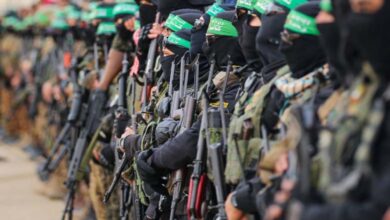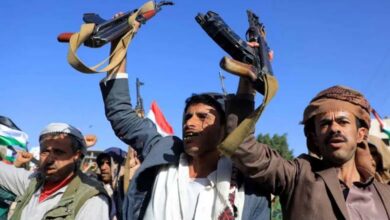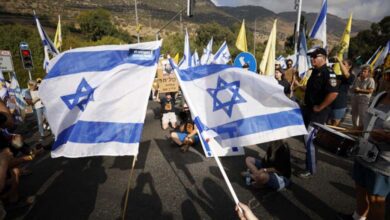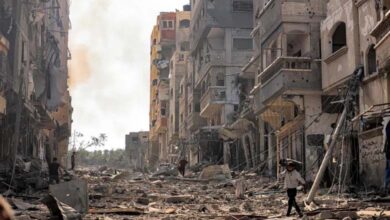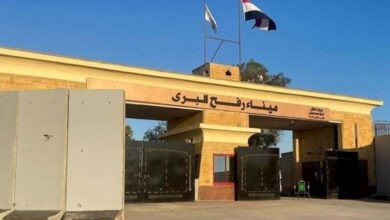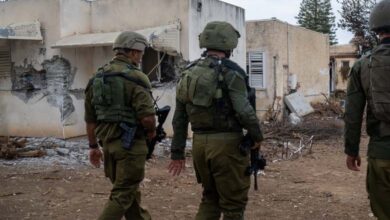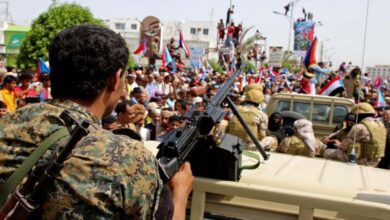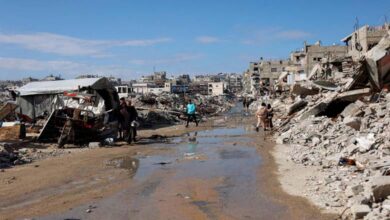Israel Controls Rafah Crossing to Pressure Hamas
Qatari delegation heads to Cairo to resume Gaza ceasefire talks after Hamas accepts Egyptian-Qatari proposal
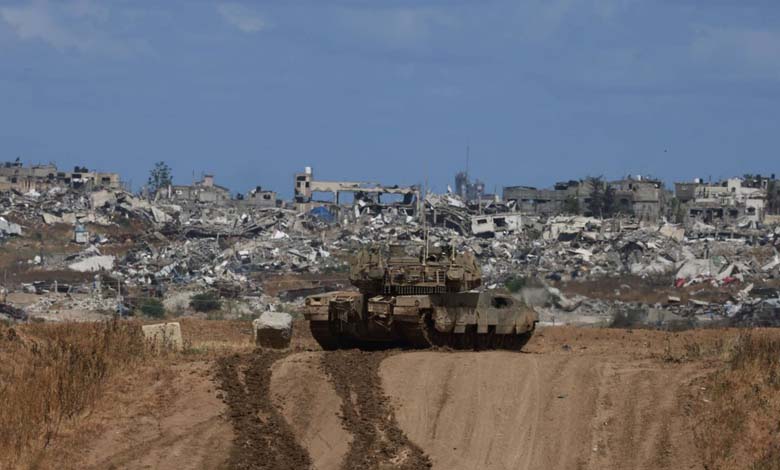
Israeli army radio said Tuesday that Israeli forces had taken control of the Palestinian side of the Rafah crossing in southern Gaza on the border with Egypt, despite the announcement by the Islamic Resistance Movement (Hamas) of its acceptance of a proposal presented by Egypt and Qatar to halt hostilities in the strip.
The army said in a statement that “Brigade 401 forces had achieved operational control of the Rafah crossing from the Gaza side.”
It added, “Forces cut off the Rafah crossing from the Salah al-Din axis, and now armored forces from Brigade 401 fully control the crossing,” noting that “special units launched an attack on the eastern area of Rafah,” whose residents were forcibly evacuated.
It claimed that during the attack, “20 militants were killed and three large underground wells were found in the area,” noting that “forces are now conducting sweeping operations in the areas they have taken control of,” and confirming that “there were no casualties among our forces overnight.”
Earlier Tuesday, reporters reported that Israeli armored vehicles had penetrated the Rafah crossing, after a night of heavy shelling around the crossing and reports of clashes between the Israeli army and Palestinian factions.
Rafah Crossing’s media director, Wael Abu Mohsen, said all travel and humanitarian aid movement through Rafah Crossing had been completely halted, as reports circulated of Israeli armored vehicles entering it.
An unidentified video clip showing an Israeli tank moving inside Rafah Crossing also circulated on social media. Other images showed the Israeli flag raised above tents inside the crossing.
UN agencies said Tuesday that the two main crossings into the Gaza Strip remain closed, effectively blocking external aid to the territory, which has very few stores.
Jens Laerke, spokesman for the UN Office for the Coordination of Humanitarian Affairs, said at a press conference in Geneva that “Israel has closed the Rafah and Kerem Shalom crossings as part of its military operation in Rafah,” adding that “the two main crossings for aid to enter the Gaza Strip are now closed,” and that UN agencies have very few stocks inside the Gaza Strip due to the continued consumption of humanitarian supplies.
He added, “Preventing fuel from entering Gaza for a long period undermines humanitarian relief efforts in the sector.”
The Egyptian Foreign Ministry said in a statement that Egypt warned Tuesday that the Israeli operation in the city of Rafah, south of the Gaza Strip, threatens the fate of strenuous efforts to reach a sustainable ceasefire in Gaza.
Israel said the conditions in the proposed ceasefire agreement did not meet its demands and continued to strike Rafah with the firm intention of continuing negotiations on the agreement.
The ongoing war developments for seven months come as Israeli forces bombard Rafah by air and land. Residents have been ordered to evacuate parts of the city where more than a million displaced Palestinians have sought refuge.
Hamas said in a brief statement Monday that political bureau chief Ismail Haniyeh had “made a phone call with Qatari Prime Minister Sheikh Mohammed bin Abdulrahman Al-Thani and Egyptian intelligence chief Mr. Abbas Kamel, and informed them of Hamas‘s agreement on their proposal regarding a ceasefire agreement.”
Netanyahu‘s office later announced that the ceasefire proposal did not meet Israel’s requirements, but that it would send a delegation to meet with negotiators to try to reach an agreement.
The Qatari Ministry of Foreign Affairs said that a delegation from Doha would head to Cairo on Tuesday to resume indirect talks between Israel and Hamas.
Netanyahu‘s office said in a statement that the war cabinet had agreed to continue operations in Rafah. Jordan’s Foreign Minister Ayman Safadi wrote on Twitter that Netanyahu was risking undermining the ceasefire by bombing Rafah.
An Israeli official said that the proposal Hamas announced its agreement on is a “watered-down” version of an Egyptian proposal that includes elements Israel cannot accept. The official, who spoke on condition of anonymity, said, “This appears to be a ruse aimed at making Israel look like the side refusing the agreement.”
Another official familiar with the proposal said Hamas agreed to an Israeli proposal presented on April 27, including stages for a ceasefire and the release of hostages, with only minor changes that do not affect the main provisions of the proposal.
State Department spokesperson Matthew Miller said Washington would discuss Hamas‘s response with its allies in the coming hours and that the agreement is “very much achievable.”
The Israeli military campaign has killed over 34,600 Palestinians, according to health officials in Gaza. The United Nations has warned that famine is imminent in the territory.
The latest war in Gaza broke out when Hamas militants attacked Israel on October 7. Israel says the attack resulted in the deaths of around 1,200 people and the holding of 252 hostages, with 133 of them still believed to be in Gaza.
Any ceasefire would be the first cessation of fighting since a week-long ceasefire in November, during which Hamas released about half of the hostages.
All efforts to reach a new ceasefire have since failed, with Hamas refusing to release more prisoners without a commitment to end the war permanently, while Israel insists on discussing only a temporary ceasefire.
Taher al-Nono, a Hamas official and media advisor to Haniyeh, said the proposal meets the movement’s demands regarding reconstruction efforts in Gaza, the return of Palestinian displaced persons, and the exchange of Israeli hostages for Palestinian detainees in Israeli prisons.
Khalil al-Hayya, Hamas‘s deputy head in Gaza said that the proposal consists of three stages, each lasting six weeks, with Israel withdrawing its forces from Gaza in the second stage.
Israel ordered yesterday the evacuation of parts of Rafah city, on the Egyptian border, which is the last refuge for about half of Gaza’s 2.3 million residents. Rescuers said an Israeli airstrike on a house in Rafah killed five Palestinians, including a woman and a girl.
Israel said yesterday it was conducting limited operations in the eastern part of Rafah. The operations were accompanied by intensive airstrikes, according to residents.
Jaber Abu Nazli, a 40-year-old father of two, said via a chat app, “They have been hitting since last night and today after the evacuation orders, the bombings have become more intense as they want to scare us into leaving.”
Some Palestinian families began to flee under the cold spring rain after receiving instructions via SMS, phone calls, and Arabic-language posts to go to what the Israeli army described as an “expanded humanitarian area” about 20 kilometers away. Some put children and belongings on carts pulled by donkeys, while others left in small trucks or on foot on muddy streets.
As families dismantled their tents and gathered their belongings, Abdullah al-Najjar said this was the fourth time he had fled since the fighting began seven months ago.



